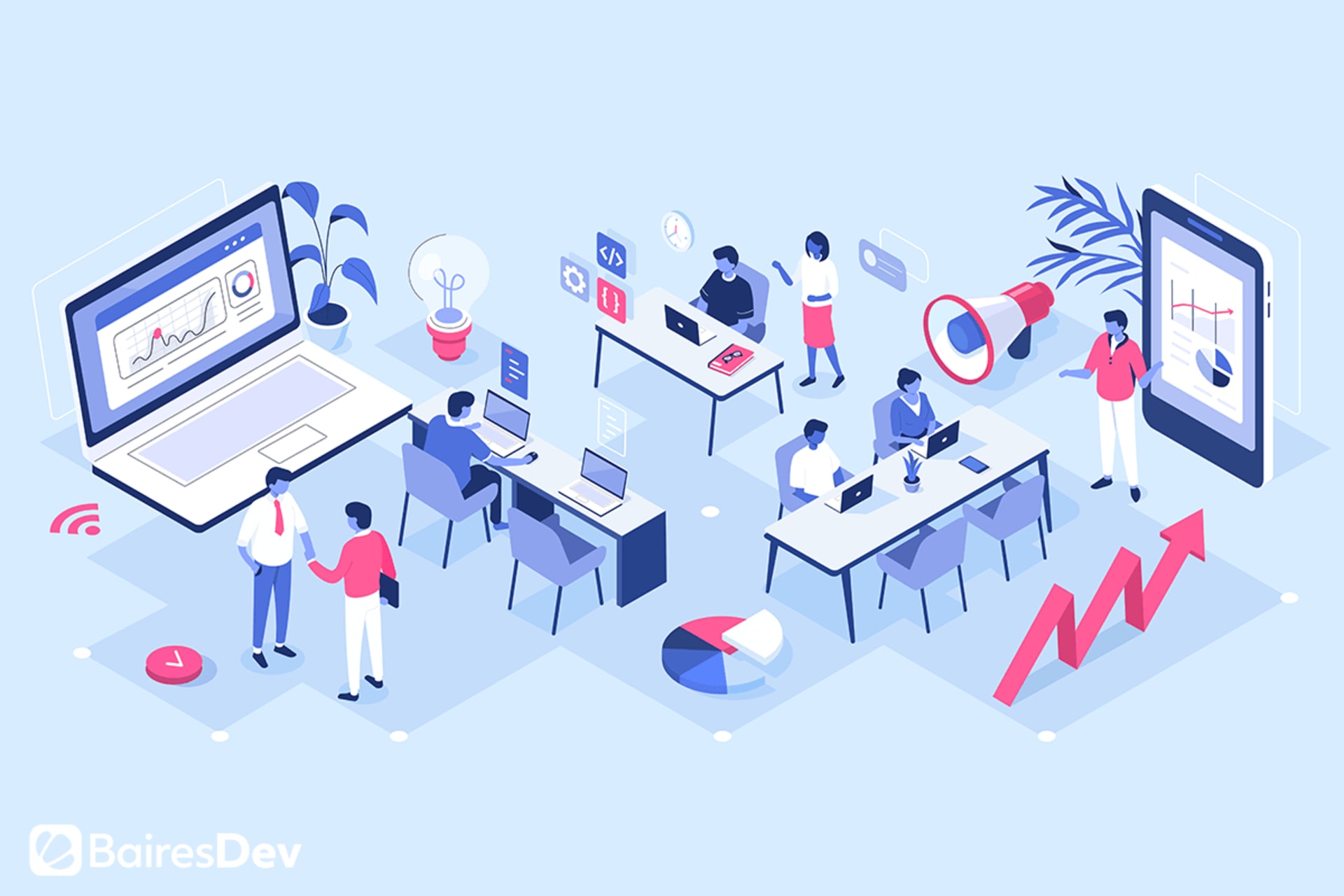It’s no secret that outsourcing has become a standard for achieving key objectives in a rapid and cost-effective manner. By taking down geographical barriers, any organization can find the best strategic partner for its purposes and build competitive advantages while accessing otherwise unobtainable resources. And with how crucial technology has become for business development these days, it’s no surprise that offshore software development has stolen the spotlight as one of the most popular forms of outsourcing.
This practice has been particularly successful among companies from the USA, Canada, and various European countries. Why? Because offshore software development allows them to access high-quality products and services at a reduced cost compared to local alternatives. As a result, regions like Latin America often stand out in the global outsourcing market due to its fast-growing talent pool and IT infrastructure.
However, outsourcing hasn’t been such an easy journey for everyone. Before getting into the industry, I’d heard plenty of times about colleagues who outsourced some type of work to a company on the other side of the world, only to receive barely acceptable or disappointing results. And when you’re dealing with technology, anything short of excellent is definitely not what you want.
Does that make offshore software development a risky endeavor? Well, I’d say it’s just as risky as buying a phone: you can either go to a store or listen to the pitch from a stranger on the street. Long story short, you don’t want to make business with anyone without a reputation. And, of course, there are various tricks you can follow to make sure you always get the most out of your outsourcing experience.
Let’s take a better look at all of that.
What Is Offshore Software Development?
Offshore software development takes place when businesses outsource work to a partner in a region with a different timezone than the company’s headquarters. An example of this would be a European company transferring control from a software development project to a partner in Latin America.
That said, the naming of services like these can change depending on the geographical standpoint of the vendor and the client, resulting in three main types of software outsourcing:
- Onshore outsourcing, which occurs when a client hires software developers in their own country or region.
- Nearshore outsourcing, which takes place when companies located in countries with similar time zones start a partnership.
- Offshore outsourcing, which brings together clients and vendors in distant countries or continents.
There’s no hard and fast rule to name the kind of outsourcing you’re embarking in. If a US company outsourced development to an Argentinian company, that could be nearshoring for some and offshoring for others. That’s why you’ll often see vendors referring to themselves as both a nearshore and an offshore development company.
Another key to understanding what is offshore outsourcing is the type of work that will be provided by the vendor. Although most of these services are fully customizable and the exact details will depend on the needs of the client and the capabilities of the vendor, offshore software services can be placed in three main categories: Delivery Teams, Staff Augmentation, and Project-Based Outsourcing.
Delivery Teams
Also known as Dedicated Team, a Delivery Team is an autonomous group of engineers that works in parallel with the client’s in-house team. They typically include a Scrum Master, a Project Manager, and any software engineering role required for each specific project, including QA engineers and testers.
The outsourcing vendor should have the onboard talent to form Delivery Teams very quickly. The best software development companies can even build tailored-fit teams in about a week. This makes it easier for clients to jumpstart their projects and start freeing up internal resources by transferring workloads to their development partners.
Just like any software team, Delivery Teams use agile methodologies to divide a project into sprints and efficiently tackle the backlog throughout the software development life cycle. This allows the vendor to continuously attack priorities and adjust the project based on the feedback and discoveries revealed during testing.
Delivery Teams are an ideal choice for companies who are to develop high-quality software but don’t have the infrastructure or talent available to do so. However, the constant level of communication and status reports provided by the outsourced team means that you will probably need a Product Owner to be on top of everything at all times.
Staff Augmentation
Staff Augmentation is the preferred service model for companies that already have some form of internal IT or software development department. It provides an “extended team” that works as part of the client’s local team, even attending daily meetings and reporting directly to managers. This is also an on-demand service, meaning that you can increase, decrease, or change the roles in the extended team at any moment and according to the changing needs of the project.
The Staff Augmentation service model became popular because of one elemental truth of software development: technology evolves too fast, and having the right-sized team with the right expertise on board is necessary to guarantee success. In other words, staffing provides the speed, professional acumen, and flexibility your team needs to scale quickly and complete development on time.
Through IT staffing, any organization can bypass every speed bump related to sourcing, recruiting, and retaining talented software engineers. However, you should also bear in mind possible ramp-ups related to projects that require exclusive knowledge of company culture and context or that rely too much on flawed internal processes.
Staff Augmentation is a perfect choice for companies that need to quickly integrate outstanding software engineers into their team. This way, you can immediately find the right fit for hard-to-fill or temporary positions, which boosts the scalability and efficiency of project development.
Project-Based Outsourcing
Project-Based Outsourcing is what we all know as software outsourcing. This is a full-cycle, end-to-end process in which the vendor takes care of absolutely all aspects of the software development process: from establishing the specs to allocating workflow, setting timescales, implementing quality assurance and testing, and providing support and maintenance services.
Although Project-Based Outsourcing became popular due to its cost-saving capabilities, today it’s mostly known for what it brings to the table: talent. Outsourcing an entire project gives companies access to a vast software engineering talent pool that wouldn’t be approachable otherwise. Businesses can thus take advantage of a broad set of specialists that go way beyond their in-house teams and local talent pools.
This service provides the resources necessary to execute complex and time-bound projects without the need to have any onboard tech talent. Nonetheless, it’s best to go about it with a clearly defined project scope so that the end product turns out to be what you actually wanted. In any case, your partner company will also act as a consultant on project management, choice of the technology stack, and any other area from the client’s end that requires support.
What Are the Benefits of Offshore Development Services?
In its many forms, offshore software development brings a series of benefits to the table. Some of the most notable include the following.
Access to Top tech Talent
Having worked in the IT industry for so many years, I’ve seen firsthand how valuable tech talent is in the development of successful software products. Working with the best software developers in the region is key to move any project forward—and that’s exactly what offshore software development gets you. This way, you won’t have to worry about sourcing, hiring, and retaining talented developers.
Optimized Workloads
When a company isn’t used to developing software in-house, it’s always shocking for them to find out how much their workload increases as the project progresses. More often than not, businesses lack the proper talent on board, which leads to speedbumps time and time again. Offshoring takes all of this out of the equation so you can focus your time and resources on your core business.
Industry Expertise
No matter what kinds of services you provide, we all know there is no substitute for years of expertise and industry know-how. Offshore software development companies don’t just know the ins and outs of the IT industry itself, they also have an all-star team of senior developers at their disposal that have mastered most, if not all, the software technologies available today.
Reduced Risks
Risk is always a huge factor when developing software on your own. Working with custom-built development teams of talented developers immediately brings this value as close to zero as possible. They will always apply the best and latest practices to your project, guaranteeing project flexibility, and workflow efficiency.
Faster Launch Times
Getting out to the market at the right time can be the difference between success and failure. Companies that rush development to speed up their launch times often compromise the quality of their product or the value offered to their customers. An outsourced dedicated team can create the right custom-solutions for the enterprise and assemble a detailed roadmap to successful market launch.
Greater Scalability
Every in-house team has a cap on performance which is why, as your project progresses, you are going to want to maintain as much headroom as possible. While hiring new staff is always an option, the time and resources you need to invest to guarantee a successful hire often outweighs the cost of opportunity of augmenting your team or working with a delivery team, both of which already have the best developers on board.
Higher-Quality Software Products
With all of the previous benefits combined, it’s easy to see how outsourcing IT solutions leads to higher quality software products. Having the best engineers and most experienced project managers on your team will definitely lead to a better result than you could achieve on your own. Even tech giants like Amazon, Netflix, and Google outsource development to offshore companies to access all of these benefits.
How to Choose an Outsourcing Company
Picking the perfect offshore company can be a little tricky, especially given how many there are around the world. That’s why you should keep these key points in mind to choose a top software company.
Fluent Communication and Workflow
Fluent communication and workflow is the most critical step to offshoring. Your Software Outsourcing partner should be perfectly fluent in English or the language of your choice. Also, their work process should match your workflow throughout the development cycle.
Standardized Security Protocols
In an increasingly tech-driven world, cybersecurity is more important than ever. Make sure the IT company of your choice has up-to-date security protocols for keeping all data and software products safe.
Top Talent Software Engineers
Offshore software development outsourcing gives you access to world-class tech talent. It’s the job of an offshoring company to gather the best software developers from the region and use their talent to build the best possible product for you.
Quality Experience
Always check references, past clients, and completed projects of your potential IT partner. This information will give you some insight into the IT company’s performance, workflow style, and quality of software products.
Full Range of Services
What you need today might not be what you need tomorrow. The best outsourcing companies that specialize in a wide range of fields will be able to handle your project from a holistic and highly-experienced approach.
When to Hire Offshore Developers
There are many situations in which offshoring becomes the most viable option. Here are some of the most common ones.
When you lack in-house tech Talent
Top talented offshore developers are scarce on a global scale. IT Companies work with remote methodologies to overcome this challenge.
When you need to fill specialized roles
Many projects require either super-specialized technical roles or temporary positions that aren’t attractive for top talented developers.
When you’re dealing with complex projects
Tackling a complex project requires a lot of know-how and technical expertise. Without those, it’s easy to run into speed bumps and accumulate downtime.
When you are working on tight deadlines
Getting the right results at the right time can be the difference between success and failure. Offshore developers scale your capabilities when needed.
When you need expert support and consulting
Software outsourcing companies provide consulting and support solutions for existing or ongoing projects that have fallen off the tracks.
When you want to maximize cost-efficiency
IT development companies completely eliminate the costs of hiring in-house staff while providing the same or better benefits.
5 Steps to Take Before Working with an Offshore Development Company
The better prepared you are, the better results you will be able to achieve.
- Define your Goals: Offshoring services boost your company’s capabilities to reach its goals. Having a clear idea of what you’re aiming for and the results you expect in a given time frame will make it easier to plan a custom technology solution that matches your needs.
- Set Priorities: While offshore development companies will help you build a detailed roadmap of your project, at first it’s up to you to state what matters most for your company and your clients. Make a list of what should be the development priorities in the short and long term.
- Paint your Vision: You bring the idea and your development partner turns it into real software. The clearer the picture, the faster your project will come out of the wireframing and sketching stage. Remember, you aren’t building a product —you’re building an experience.
- List your Needs: Every project requires a different technology stack and different engineers with expertise in a wide array of fields. Check different service models and technologies to get a feel of how they could fit in your project.
- Put it All on Paper: Proper documentation speeds up any process and makes everything much more transparent. Based on your needs, your offshore team will help you choose the best solution to achieve your goals on time and cost-efficiently.
How Can Outsourcing Technology Solutions Help You Grow Your Business?
In essence, software development services help your business grow by providing customized solutions that lead to high-quality results. Not only that, but outsourcing also allows you to free up internal resources so that your in-house teams can focus on your core business while you gain access to world-class IT staff—which means your business will be able to grow effectively from both fronts at the same time.
Among other things, software development services can also help your business grow by:
- Implementing new technologies that give you an edge over your competition.
- Providing access to on-demand talent based on your project requirements.
- Cutting down capital and operational expenses on IT.
- Bypassing processes like personnel training and hardware purchasing.
- Reducing development time so you can launch products faster.
- Giving you project flexibility, guidance, and constant expert support.
Keep in mind that the best software development companies tailor their work to a perfect fit for their clients. This comes along with constant communication and cooperation throughout the entire development process. The bottom line is: yes, software development services can help your business grow in many ways. In fact, it’s one of the most effective ways to scale your software projects.
Remember That Communication Is Always the Key to Successful Offshoring
While working with offshore software outsourcing companies comes with many benefits, the success of any project depends mostly on one major factor: communication. Setting an efficient workflow with your development team will determine how fast your project progresses, as well as the quality of the final product.
Your IT partner will always be interested in establishing a productive and professional relationship with you. Use that to your advantage by asking as many questions as you can and giving the most honest feedback possible. Even if your project wasn’t all that defined at the beginning, these directions will build the concrete foundation upon which offshore developers can work and bring valuable results to the table.
And keep that feedback cycle going throughout the entire development process! Whatever communication channel you and your IT partner use to collaborate (email, phone, video calls, web platforms, etc), go back to it periodically to make the most out of your software development journey.
When is the Best Time to Outsource?
Offshore software development is all about creating customized solutions that work for your particular business in your specific environment. If you have a raw idea that needs to become an actual software product, you might be at the point where outsourcing development is the better choice.
That said, there isn’t a “stage” where businesses become able to outsource. It all depends on the goals and challenges your company is currently facing. We could be talking about one-person startups that haven’t even hit the market or international companies with dozens of years of experience who are looking to embark on their digital transformation. Both of them require tailor-fit software solutions that match their workflow and objectives—and that’s the entire basis for the software outsourcing industry.
As a starting point, consider your project’s schedule, identify your available internal skills and resources, define your budget, and do some research on how to choose a software outsourcing company.
So, Is Offshore Software Development the Right Move for Your Company?
If you’re looking to develop high-quality software products rapidly, cost-efficiently and without sacrificing scalability, then 9 times out of 10 outsourcing offshore software development will make the most sense. However, it’s always advisable to have a complete overview of the project at hand before deciding on this option.
When talking to a development company, you’re going to want to go over these points:
- Clearly define your audience and potential customer base. Your product should offer features that matter to them and that stand out from the competition.
- Layout a roadmap or step-by-step process that shows what goals and milestones your project should achieve in a given time frame to call it a success. Your priorities should always dictate how the project progresses.
- Take into consideration delivery dates and how the software outsourcing company will boost efficiency in this process.
- Prepare and show mockups or wireframes of what you want your future software product to look like. Your partner should know exactly what you want to accomplish, how you want to do it, and what your ideal future will look like.
- Talk about the technologies and skillsets your project would need. Even if you know nothing about programming languages or development operations, it’s always good to listen to what your partner can offer.
- Establish communication protocols and communication channels that both parties must comply with at every time.
- Identify the appropriate accounting and document-sharing platforms to guarantee data security and transparency. This also includes time tracking and payment log tools that may or may not be necessary.
- If your project calls for it, ask for a non-disclosure agreement and revise the different types of contracts that the software development company offers.
- And, finally, learn more about the post-development strategy and services that your future partner can offer. If everything works out, extended deals can keep your project growing over time.
About BairesDev
BairesDev is a leading technology solutions company based in San Francisco. By employing only the Top 1% of tech talent, the company is able to build tailored-fit development teams and provide fully-customizable end-to-end solutions for startups, middle-market businesses, and more than 10% of Fortune 500 companies.
With a team of over 1,300 experts in practically every technology imaginable, BairesDev continues to expand its operations to the rest of the globe. No matter the project, there is always a common philosophy: to innovate and simplify in order to make the highest quality software in the most efficient way possible.






